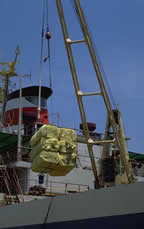|
In a previous Eco-Logical, we outlined how global corporations are using the World Trade Organization (WTO) and global trade agreements to squeeze down wages and workers' rights and ramp up profits and market reach. As if that weren't bad enough,
 the current approach to international trade agreements like GATT, NAFTA, and FTAA is setting us up for more pollution, more "frankenfood," and more chemicals. The only good news we can offer is that none of this global hoo-ha has anything to do with international cuisine and you can continue to enjoy tacos, egg foo yung, and gyros without creating a threat to anything other than your waistline. Oh joy.
the current approach to international trade agreements like GATT, NAFTA, and FTAA is setting us up for more pollution, more "frankenfood," and more chemicals. The only good news we can offer is that none of this global hoo-ha has anything to do with international cuisine and you can continue to enjoy tacos, egg foo yung, and gyros without creating a threat to anything other than your waistline. Oh joy.
There are several ways that the WTO and global trade agreements have an impact on our environment and food:
- Global trade agreements can trump national, state, or local environmental laws and regulations.
- Shipping pollution is greatly increased.
- Potentially unsafe genetically modified crops from global agribusiness are promoted at the expense of local, sustainable farming solutions, giving corporations further control over our food supply.
We'll discuss each of these problems in turn.
It's hard to believe that corporate executives are so money-hungry that they're in favor of more pollution in the air they breathe, more toxins in
 the water they drink, and more chemicals in the food they eat. But the tendency is pretty clear: Major corporations have a general dislike for environmental regulations.
the water they drink, and more chemicals in the food they eat. But the tendency is pretty clear: Major corporations have a general dislike for environmental regulations.
Until recently, the laws governing industrial pollution were mostly encompassed within the body of national, state, and local laws. Corporations had to follow those laws. They might lobby to have laws or regulations changed, but for the most part, they had to toe the line.
With globalization, corporations have found a much more effective way to deal with national, state, and local environmental laws they don't like—they use the provisions of a trade agreement to get the law declared a "barrier to trade." For instance, NAFTA's Chapter 11 allows corporations to sue governments for damages if a government law affects their profits.
The watchdog group Global Exchange points out two examples of global trade agreements being used to trump US law:
- The first WTO panel ruled that a provision of the US Clean Air Act, requiring both domestic and foreign producers alike to produce cleaner gasoline, was illegal.
- The WTO declared illegal a provision of the US Endangered Species Act that requires shrimp sold in the US to be caught with an inexpensive device allowing endangered sea turtles to escape.
More recently, the US has used the threat of legal action under WTO rules to bully the European Union into opening their farm fields and food shelves to genetically engineered crops and food, despite the fact that a strong majority of Europeans favor a complete ban on GMOs.
 One negative environmental aspect of global trade that doesn't get a lot of attention is pollution from transportation. Large diesel trucks tend to be highly polluting, and the diesel engines of transport ships are even worse, partly due to their use of low-grade fuel. Ships also tend to leak fuel, lubricants, and other bad stuff into the water. The more trade there is, the more transportation of goods there will be, and the more pollution that will result.
One negative environmental aspect of global trade that doesn't get a lot of attention is pollution from transportation. Large diesel trucks tend to be highly polluting, and the diesel engines of transport ships are even worse, partly due to their use of low-grade fuel. Ships also tend to leak fuel, lubricants, and other bad stuff into the water. The more trade there is, the more transportation of goods there will be, and the more pollution that will result.
This is not to say that trade should be banned just to stop such pollution—after all, there are other ways to address the pollution issue. But we should at least consider the impact that trade has on global pollution and choose locally sourced items whenever possible. For instance, why do we allow (or even encourage) the trading of cattle between nations that both grow cattle? Check out some of the other silly cross-shipped product arrangements in the table below. It makes no real sense—except to the middlemen who profit on the transfer.
| |
|
| Coffee |
41,200 |
42,300 |
| Sugar |
70,800 |
83,100 |
| Potatoes |
365,400 |
324,500 |
| Green Beans |
27,000 |
32,500 |
| Pork & Beef |
953,100 |
899,800 |
| |
Source: Organic Consumers Association / ODE Magazine |
|
The WTO and other international super-governmental organizations are helping corporations push genetically engineered crops as the solution to many countries' hunger problems. It would be unfair to say that GM crops have no potential to help feed the world in the future, but it is fair to say that the current approach—which focuses on grain crops, soybeans, and cotton, rather than on indigenous food crops—is not helpful.
|
As mentioned previously, developing nations are not the only ones facing an unwanted plague of GM foods. In 2004, European prohibitions against GM crops were retracted because of pressure brought by the US at the behest of agribusiness corporations—and using the WTO as the vehicle for the pressure.
|
|
CLASH OF THE FRANKEN-TITANS |
|
It will be interesting to see how the apparent conflict will be resolved between pro-GM global trade agreements and the Cartegena Protocol on Biosafety. The Biosafety Protocol, which entered into force in September 2003, allows governments to apply the precautionary principal—that is, to assume something is a problem until it's proven that it isn't—when considering whether to allow importation of GM crops, seeds, or food.
|
|
Finally, despite polls showing that a wide majority of people on the planet want GM foods labeled, agribusiness corporations don't like the idea and national governments have refused to do so. Some international trade agreements feature "harmonization," via which labeling laws will be merged to the lowest standard—i.e., no labels for GM foods—thus granting the desires of the corporations over the desires of the public.
As an individual or as a family, one of our most important feelings of security is that we can provide food for ourselves. In developed nations, we don't typically grow all of our food ourselves,
 but in developing nations, many people do. The ability to feed oneself should be considered an inalienable right.
but in developing nations, many people do. The ability to feed oneself should be considered an inalienable right.
Global trade agreements are being used to trump this right, to allow the importation of heavily subsidized food crops from developed countries into less-developed nations. The impact on small and subsistence farmers has been huge and local farm economies have been crippled in developing nations. For instance, Mexico's indigenous corn (maize) farmers have been devastated by the importation of cheap, subsidized corn from the United States. The Institute for Agriculture and Trade Policy, an agricultural-policy research group, estimated that in the 1990s, the US sold corn at almost 60% below-cost. It used similar predatory pricing practices for other agricultural commodities:
- it sold cotton at almost 60% below-cost;
- it sold wheat at 40% below-cost;
- it sold soybeans at almost 25-30% below-cost.
These tactics soak the American taxpayer and drive farmers in Africa, Asia, and Latin America out of business by unfairly dumping cheap commodities. Although some global food trade is a good thing, unfair practices that drive small farmers out of business and ruin rural economies are not.
Another threat to EVERYONE'S food security is agribusinesses' attempts to convert farmers' seed stocks to patented varieties, where seed saving is disallowed. The companies claim that this is necessary to ensure that their intellectual property rights are protected. But what if we one day reach a point where ALL seeds are patented and cannot legally be saved; or worse, if all seeds employ agribusiness' "terminator technology" that renders them unplantable for subsequent seasons, making us fully reliant on giant corporations for the most basic ingredient needed to grow food. From a corporate point of view, this is a neat way to maximize market share. From a global citizens' point of view, it's a disaster waiting to happen.
Like most things, global trade is not inherently good or bad. The devil is in the details—the details of why it's done, how it's done, and what products move back and forth.
What's being done now, however, is generally benefiting wealthy transnational corporations far more than the globe's average citizens, and it certainly is having an impact on the quality of our air, water, and food. That doesn't sound like a bargain to me—how about you?
Know someone who might find this article interesting?
Please forward it to them
Resources:
Books:
More articles and resources on....
Get Grinning Planet free via email
|


